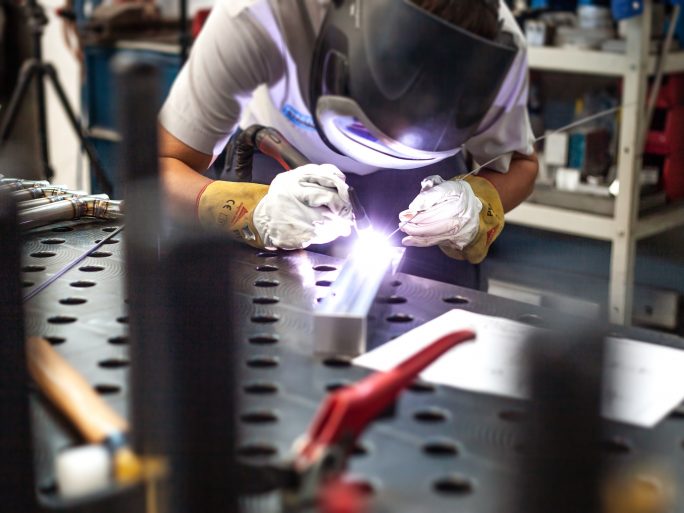Mechanical Engineering in the Cloud

Resch Maschinenbau is making the leap to the public cloud and is relying on SAP S/4HANA in the public cloud version.
“The markets are highly volatile,” says Robert Böck, commercial director of Resch Maschinenbau. “The price of steel alone has risen by more than 50 percent in the last year and a half.” But things are going well for the mechanical engineering company from Bavaria: despite the high cost of materials, the order books are full. With production parts, assemblies and complete machines, Resch together with sister company Power-Heat-Set generated annual sales of around 25 million euros with international customers from the food, packaging, pharmaceutical and cosmetics industries.
In the meantime, Resch – closely interlocked with its sister company – manufactures more and more complex assemblies individually to order. Power-Heat-Set not only develops equipment for heat-setting in the context of textile carpet production, but also provides support in sales, after-sales and service for Resch’s products. No easy task to convert this broad business model. Considering the wide range of processes involved, it was clear that Resch’s IT department needed support. What is missing are flexible, automated processes.
From on-premises to public cloud
Initially, Resch did not see the solution in the cloud. The step from on-premises to the scalable public cloud initially seemed too big. That’s why classic hosting was also on the cards. After a Digital Discovery Assessment (DDA), the mechanical engineering company decided on SAP S/4HANA in the public cloud version in the summer of 2021. The ERP cloud system convinced with preset best-practice functions that map all of Resch’s business processes. In addition, concrete software tests and demos made it clear in advance where the solution can accelerate and optimize processes.
Resch hopes that the cloud solution will enable it to handle more orders with the same workforce. After all, the shortage of skilled workers is also noticeable for the mechanical engineering company. According to the German Engineering Federation, 60 percent of the German companies surveyed are currently looking for technicians and/or master craftsmen. The situation is no better for IT specialists. The automatic updates of the cloud solution and innovations without release changes therefore mean a relief for Resch’s IT department.
Largely independent migration
“The leap to the public cloud is not easy,” says Robert Böck, Commercial Director at Resch Maschinenbau. In Cpro INDUSTRY, Resch found an SAP partner company to advise the mechanical engineering company from the decision-making process through to system migration. However, Resch’s IT department will carry out the migration largely independently. The conversion to SAP S/4HANA will take a total of 14 months, and all modules are scheduled to go live at the beginning of 2024: from Sales and Distribution to Finance and Controlling, Production Planning, Material Management and Extended Warehouse Management.
The cloud solution will primarily simplify manual operations in the areas of production planning and warehouse management. This is because outdated processes have slowed down the machine manufacturer up to now: Once a production order is linked to a customer, employees can only rebook it manually, which is time-consuming. Since Resch now focuses on manufacturing according to order, such adjustments in the system are becoming more frequent. In the future, S/4HANA will enable flexible rebookings in every project phase.
Much more flexible production
In addition, the previous software does not display planned and “sharp” production orders separately. This makes it difficult for technicians to plan ahead and prioritize which of the 4,000 or so orders they will process first. Yet they have to do this in order to order needed materials and deliver products to customers on time. Here, too, the ERP solution in the cloud offers a helpful feature: it distinguishes between the two categories from the start. “With the new cloud solution, the number of sharp production orders will drop below 1,000, and our production will become much more flexible,” predicts Böck.
The SAP software also offers more flexibility with regard to material prices: It automatically displays current fluctuations and applies new prices to the respective order in just a few clicks. In this way, Resch can inform its customers earlier about cost changes and reschedule in good time, if necessary.
Automated data structuring in the ERP cloud.
“As a small company, we have very similar requirements to large ones,” says Böck. “That’s why we rely on SAP processes and automated data structuring in the ERP cloud. With the SAP standard functions, we can cover most of the requirements of our daily work – which shortens the conversion phase.”
And what comes after the migration? During ongoing operations, the system will be put to the test and evaluated. In addition, employees will receive training and tasks to learn the new booking processes. In the second step, Resch 2025 wants to add further functions to the cloud solution, which can be used especially by its sister company Power-Heat-Set. For example, by integrating existing modeling systems (CAD) into the cloud interface or mapping its product lifecylce management and customer relationship management via the software. This is also to Resch’s delight: After all, the two companies are pursuing a common course for success, which they will be able to further in the future via the same cloud environment with two different company codes.